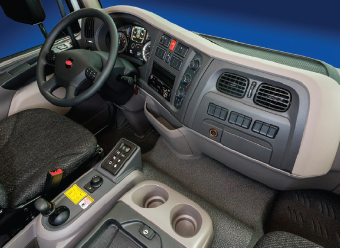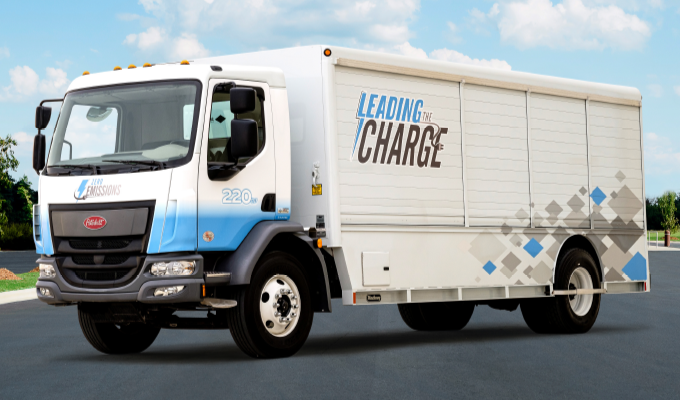If 2020 has taught us one thing, it’s that delivery is essential. Since the pandemic hit, the US saw an uptick in online shopping, receiving medical supplies via mail, and even grocery shopping through delivery services.If there’s another thing the year has taught us it’s that air quality improves when fewer vehicle exhaust emissions are pumped into the air. At the start of the pandemic when shutdowns cut passenger and commuter vehicle travel in half, areas such as San Francisco saw a reduction in CO2 emissions by about 25%.
Will the increase in delivery volumes continue as the COVID-19 vaccine rolls out and as life returns back to pre-pandemic normalcy? Some data has shown that, at least for grocery shopping, the delivery method is here to stay, according to Digital Commerce 360.
With delivery volumes at their highest and with civil demand and government regulations calling for cleaner fuels, delivery businesses should get ahead of the game.
PETERBILT’S ANSWER
Two years ago, Peterbilt unveiled its 220EV. The 220EV is Peterbilt’s answer for an electric medium-duty vocational vehicle. It’s ideal for pickup and delivery, it features a range of 200 miles on one charge, and it gives off zero emissions.
The 220EV’s all-electric powertrain includes Lithium Iron Phosphate (LFP) battery packs that are mounted outside the frame rails and air tanks mounted inside the frame for weight distribution. Inside the 220EV’s power electronics cradle is where all the magic happens. It rests where a traditional diesel engine would rest at an easily accessible location. The cradle houses the on-board charger, vehicle software, battery disconnect controls, the air compressor, and the cab heater unit.
The Class 6 E-motor gives owners 154kW (207 hp) of continuous power. It offers 250 kW (355 hp) of peak power. The Class 7 E-motor pumps out 259 kW (347 hp) of continuous power and 350 kW (469 hp) of peak power. There’s no need for a transmission in the 220EV, because this truck’s electric direct-drive motor provides power to the drive shaft.

HOW IT WORKS
The functionality of Peterbilt’s E-motor is simple. The inverter converts energy from batteries to provide power to the electric drive motor. Then, as stated before, the direct-drive motor sends power to the drive shaft. The LFP battery packs are thermally controlled with the 220EV’s chiller (mounted inside the frame rails) to provide a consistent temperature for longer battery life. Finally, regenerative braking harnesses energy from the vehicle to maximize range.
WHAT YOU NEED
Depending on the needs of your business, Peterbilt offers a Class 6 or Class 7 configuration of the 220EV. Other configurations include a 141 kWh energy storage with a 100-mile range or a 282 kWh energy storage with the 200-mile range.
The truck is also available with AC charging or DC fast charging. The AC offering features a 19.2 kW power rating with a 7.5- to 15-hour charge time. This is better for fleets that run trucks only during the day and plan to keep trucks parked at night. The DC fast charge offering has a 150 kW power rating with a 1- to two-hour charge time. This is ideal for busy fleets with unpredictable schedules.
The trucks also come in three different wheelbases (206, 218, and 274 inches) and three different body lengths (24, 26, and 30 ft). The front features a parabolic spring suspension, and owners have the choice between a Reyco mechanical, Hendrickson HAS210, or Hendrickson HAS230 Air Ride for the rear suspension.
THE DETAILS
What you need doesn’t stop at body length or battery power ratings. It goes as far as the cab, as well. The driver’s seat gets air suspension in the 220EV, while the owner has the choice of a two-person bench (standard) or another single air ride seat for the passenger. The truck features a center console with cup holders as well as cruise control, power windows, and power and heated mirrors. The cab also has a heater and air conditioning as standard features.
For further customization, owners can request speakers and wiring for an aftermarket radio. If the customer chooses a Reyco suspension for the rear, they have the option of rear shock absorbers and a rear axle stabilizer bar. Additional options for the 220EV also include rear differential lock, rear mud flaps, a backup alarm, and orange or red seat belts.
FUTURE READY
This time last year, no one could have predicted a worldwide pandemic that turned the world upside down. But no matter what happens in the upcoming year, make sure you’re prepared. Don’t fall behind in taking steps to ensure your essential delivery business is environmentally conscious.
FOR MORE INFORMATION
Find out more about the Peterbilt 220EV, visit www.peterbilt.com.




